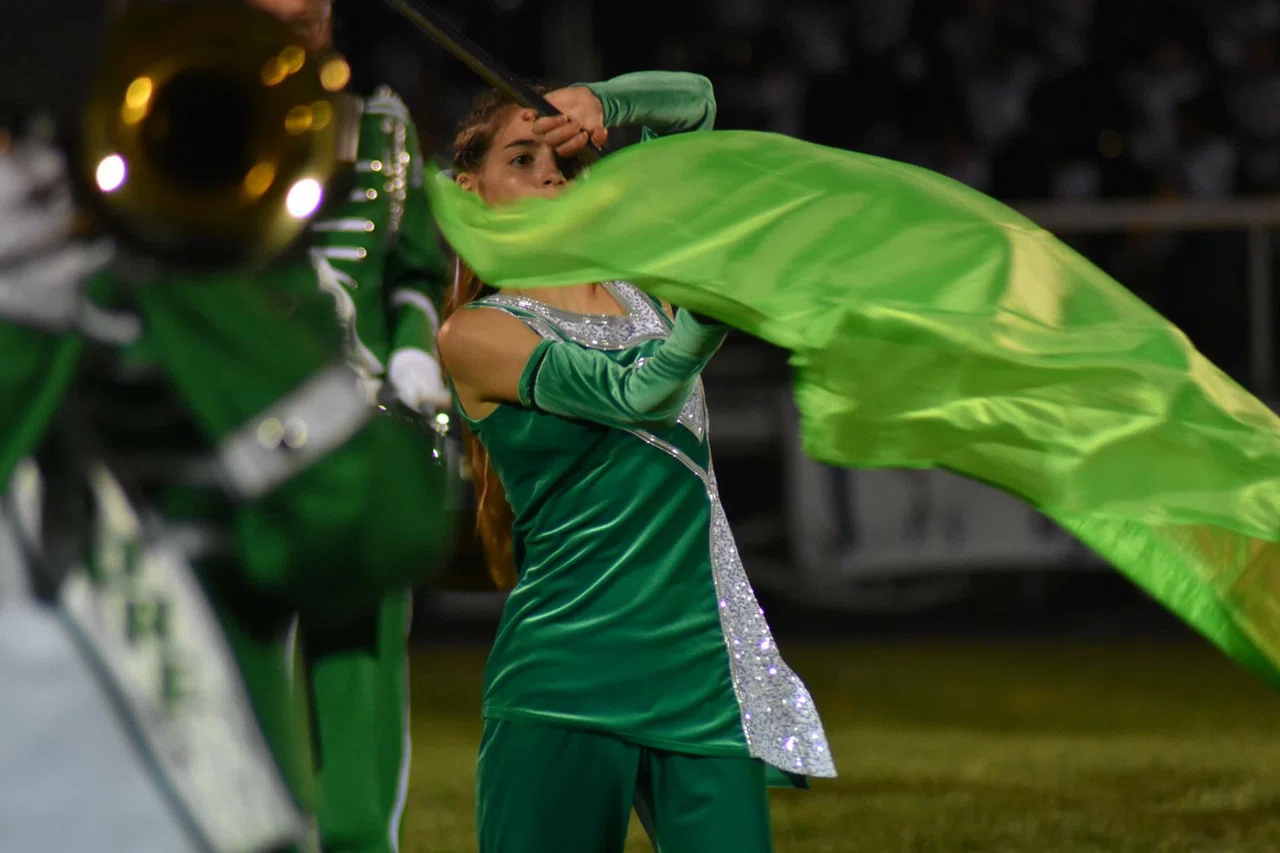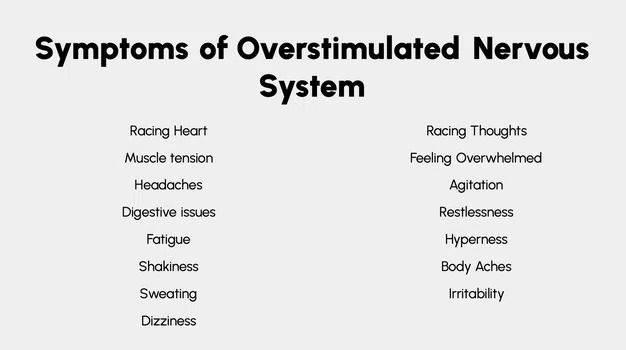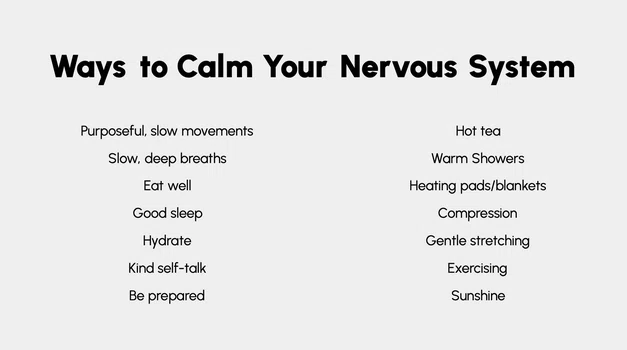©2025 Ohio Music Education Association



FEATURED ARTICLES
Band with Balance: Cultivating Nervous System Support in the Marching Arts
Band with Balance: Cultivating Nervous System Support in the Marching Arts
Dr. Beth Yoder


Dr. Beth Yoder,
University of Findlay, Bluffton University
We had just finished an incredible run of an inter-crossing follow-the-leader, and the whole band was jazzed about successfully doing it at show tempo! My eyes were drawn to our new trumpet player, Adam, who was struggling to regulate his nervous system. His eyes were darting around like he was looking for an escape, his shoulders were heaving faster than his peers, and he was rubbing his hands across his shirt. Knowing he was overwhelmed, I simply tapped him on the shoulder, and said “Adam, walk with me”. We walked to the tent, hidden behind the band trailer, where he sat in the shade eating a fruit twist I provided him. He did some calm deep breathing I modeled for him, while we reflected on how much he accomplished this morning. Within two minutes, Adam was making eye contact with me, joking around, and had his energy back. Ready to jump back into rehearsal, he thanked me for assisting him in regulating his nervous system, and off he went to join his peers.
As music educators, we know that marching band rehearsals are physically intense, as well as emotionally and mentally demanding. By integrating nervous system regulation education and strategies into our teaching, we create a more responsive, productive, and inclusive rehearsal environment. In a world where burnout and anxiety are real risks, this allows our students to thrive, establishes a collaborative and trusting community, and our rehearsals to be more productive. In the marching arts, we have the perfect environment to teach our adolescents, who are working through developmental stress, performance pressure, and identity formation, how to work through nervous system dysregulation as any or many of their five senses becoming overwhelmed (Armstrong, 2016).

In Adam’s case, he had become over-heated, mentally over-stimulated, and perhaps the loud decibels of the marching band were overwhelming as well. By recognizing he needed some assistance in self-regulating, and pulling him out of the situation before a full meltdown occurred, I was able to assist by providing some calming sensory items: the strong taste of something, flooding his brain with positive thoughts, a cool tent, a quieter location, and a calm place with someone who’s nervous system was already regulated. It helped that Adam had the tools to recognize his situation, and buy into the tools I was providing. We established this the first day of band camp, by teaching the students about their nervous systems, to expect they would feel overwhelmed at some point, and provided them with tools to use when that occurred.
How to accomplish nervous system regulation with your band
How to accomplish nervous system regulation with your band
Step One. Regulate your own nervous system, and continuously check in with yourself. This begins before band camp. Things that set me up for success are lowering my stress level by being prepared, thinking through potential/probable “fires” that will occur and need addressing, and having people surrounding me to assist. Making sure I am physically prepared for marching band – this means leading up to it I have been working out, eating right, hydrating, sleeping right, and monitoring my mental health (Bernhard II, 2021).
Step Two. Educate your band staff and students. What happens when your nervous system is overactive or dysregulated? You can experience a range of symptoms such as rapid heart rate, fast/shallow breathing, anxiousness, mental fogginess, sensitivity to stimuli, irritability, headache, upset stomach, diarrhea, changes to sweating patterns, difficulty concentrating, and memory problems (Cleveland Clinic, 2022).
Step Three. Actively provide nervous system regulation support. Now that everyone is educated, provide tools and put in place support systems. The quicker someone’s nervous system is regulated, the quicker they are fully contributing to the ensemble, and the more productive rehearsals and the band community becomes.

Nervous system regulation support
Nervous system regulation support
Here are some ways that band students and staff can easily re-set nervous systems during band rehearsals. Have a predictable routine, and when it needs to change (because we all know it will need to), communicate as much information as you are able. Teach students how to be flexible in small, safe steps, starting with your student leadership. Teach students how to do deep slow breathing, exercises that engage opposite sides of their bodies, drink a cold drink, laugh, mentally picture your favorite place to be, mentally walk and talk through new upcoming situations, let someone know you are struggling, eat something, use earplugs, use sunglass/hat, and use a personal fan. During rehearsals, we also like to use short brain breaks coupled with “gush and goes” or water breaks. Simple questions or activities such as asking what their favorite dinosaurs are, or contemplating whether a hotdog is a sandwich, can release endorphins to help reset and calm the nervous system.
Universal Design for Learning
Universal Design for Learning
Nervous system regulation support is important for everyone, full stop. However, the journey down this path began the year our HS Band enrollment included approximately 10% Autism, 17% ADHD, 13% Generalized Anxiety Disorder, 35% Diagnosed Physical Conditions, 6% IEP, and 10% 504. Having taught these students since fifth grade, I knew their needs and how to set them up for success in a rehearsal band room. I admit, the thought of meeting their needs in the marching band world felt quite intimidating at first. That is, until I began reading and educating myself on neurodivergence and importance of nervous system regulation (Nerenberg, 2021 and Price, 2022). After I became educated, I then educated my band staff and student leadership, and then the entire band ensemble. Before each new event, procedure, or experience, I prepared and taught the students about what to expect, what behaviors were appropriate, and how the experience may make them feel. Additionally, I reinforced the nervous system regulation support tools.
Ensemble Confidence will Build
Ensemble Confidence will Build
As your band begins to learn more about regulating their nervous system, through education and support from you, they will begin to find they can do it on their own. Our band now can regularly be heard telling each other between resets to “take a deep breath” or telling each other a light hearted joke before saying “okay, let’s refocus” and each rep has become more intentional and productive. When we are in performance settings, students guide each other through positive self-talk, visualizing the performance together, taking slow deep breaths, and celebrating their successes – both small and big. More than that, our band has grown as individuals, a team, a community, and a band.
In teaching students to march and play in time and together, we can also teach them to move through life with balance, awareness, and resilience.
References
Armstrong, T. (2016). The power of the adolescent brain: Strategies for teaching middle and high school students. ASCD.
Bernhard, H. C., II. (2021). Managing stress in music education. Routledge.
Cleveland Clinic. (2022, June 6). Sympathetic nervous system (SNS): Fight-or-flight. Cleveland Clinic. https://my.clevelandclinic.org/health/body/23262-sympathetic-nervous-system-sns-fight-or-flight
Nerenberg, J. (2021). Divergent mind: Thriving in a world that wasn’t designed for you. HarperCollins.
Price, D. (2022). Unmasking autism: Discovering the new faces of neurodiversity. Harmony Books.

Dr. Beth Yoder is a band director, educator, and researcher interested in Music Performance Anxiety and mental health in student musicians and music educators. Servanthood leadership, student-led problem solving, and students’ self-regulating their nervous systems are educational staples while exploring the human condition through music in Dr. Yoder’s classrooms. In her second decade of teaching 5-12 band, Dr. Yoder is the band director at Archbold Area Schools in NW Ohio.




